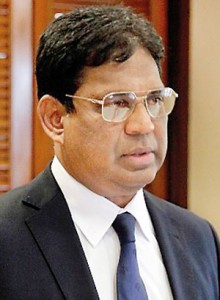News
PM talks about regaining good governance; CJ says people must know the law
The Government will go ahead with the setting up of a Truth and Reconciliation Commission (TRC) to deal with postwar issues, Prime Minister Ranil Wickremesinghe said on Friday.He was speaking at the main event of the “National Law Week 2017” at the auditorium of the Bar Association of Sri Lanka (BASL).
The premier also ruled out the establishment of a “hybrid court” as recommended by the United Nations Human Rights Council (UNHRC) saying it was “not politically feasible” as it may require a referendum.
“Generally, all parties in principle have accepted the idea of a TRC,” he said.
Mr. Wickremesinghe, however, emphasised that there must also be some form of agreement on a new Constitution. Extremists on both sides of the ethnic divide would oppose such a Constitution, but this was something the Government would have to deal with, he added.
Referring to the country’s courts system he pointed out that it was older than the political. “We had the oldest established judicial system in Asia and people had faith in that system.” However, the adverse impact of interfering with the judiciary was felt both within and without the the country he said, alluding to the loss of the European Union’s GSP Plus facility. He said the country lost this facility due to the lack of good governance. The efforts by the Government of President Sirisena, to establish good governance as well as secure the independence of the judiciary have been key to enabling negotiations to move forward, he emphasised.
The newly appointed Chief Justice Priyasath Dep told the gathering that citizens must be made aware of laws and dispute resolution systems as litigation was not the only option. There were systems such as mediation, reconciliation and arbitration. “Citizens must know their legal rights, how to enforce them and what legal remedies are available to them,” he remarked.
He however, pointed out that most legal amendments as well as subordinate legislation such as rules and regulations were not widely available. He encouraged the BASL and the Justice Ministry to take the initiative to publish them in a consolidated book. The CJ also stressed the importance of translating Ordinances from English to Sinhala and Tamil, pointing out that “to have access to the law, you must know the law.”
The CJ also praised the initiative taken during “National Law Week” to provide free legal advice and legal aid to poor-income families who have difficulty in obtaining the services of lawyers. “Although court buildings have expanded and people can have physical access to court houses, having physical access and having access to justice are two different things.”
This year’s “National Law Week” was held from February 27 to March 5. Held under the theme “Justice for you,” this year’s law week saw various projects, workshops and activities taking place islandwide with the participation of over a 1,000 attorneys-at-law representing all regional bars. The National Law Week, the brainchild of the late Judge C.G. Weeramantry, has been an annual fixture since 2006. It is organised by the BASL in collaboration with the Justice Ministry and the Legal Aid Commission of Sri Lanka. The organising committee was headed by the National Law Week Chairman Kuvera de Zoysa PC along with Convener and attorney-at-law Nishan Premathiratne.
| At a glance: Sri Lanka’s 45th CJ Priyasath Dep
He was the senior-most Judge of the Supreme Court following the retirement of CJ K. Sripavan who was born on February 29 ( a leap year), turned 65. Justice Dep served the Attorney General’s (AG) Department for more than 33 years and had the distinction of being the Head of both Civil and Criminal Divisions, and also served as acting AG on many occasions. He enrolled as an Attorney-at-Law in October 1976 and joined the AG’s Department as a State Counsel in January 1978. He was promoted to the post of Senior State Counsel in February 1989, made a Deputy Solicitor General in February 1996, Additional Solicitor General in October 1999 and a President’s Counsel in April 2000. He was appointed Solicitor General in April 2007 and functioned in that capacity until his elevation to the Supreme Court in June 2011. The CJ has prosecuted many significant cases during his time with the AG’s Department. In 1987, as a State Counsel attached to the Criminal Division, he led the prosecution in the Amarapala (Deputy Director of Customs) Murder case, which was considered a sensational case at the time. In 2002, he led the prosecution in the Inoka Sevwandi Murder case before a Trial-at-Bar. In the same case he successfully defended the appeal in the Supreme Court. In 2004, he was nominated to appear for the state in the appeal in the Sujith Prasanna Perera (Superintendent of Customs) Murder which was heard by a Trial-at-Bar successfully in the Supreme Court. During this period he functioned as the head of the Criminal Division. The new CJ is a life member of the Bar Association of Sri Lanka (BASL), Medico-Legal Society, and Royal Asiatic Society. He is a member of the International Association of Prosecutors and Commonwealth Magistrates and Judges Association. He also holds membership in the Judicial Services Commission, Board of Management of the Sri Lanka Judges Institute and Incorporated Council of Legal Education. Justice Dep is the son of the late DIG of Police, Arthur C. Dep. |


 Justice Priyasath Dep, was sworn in as the 45th Chief Justice (CJ) of Sri Lanka on Thursday (March 2).
Justice Priyasath Dep, was sworn in as the 45th Chief Justice (CJ) of Sri Lanka on Thursday (March 2).